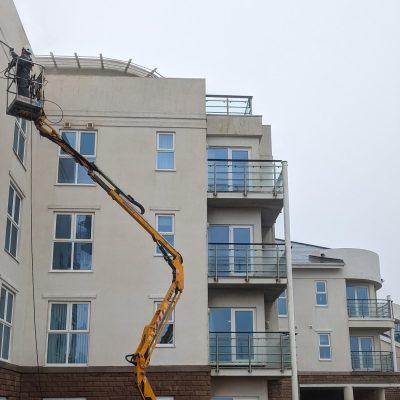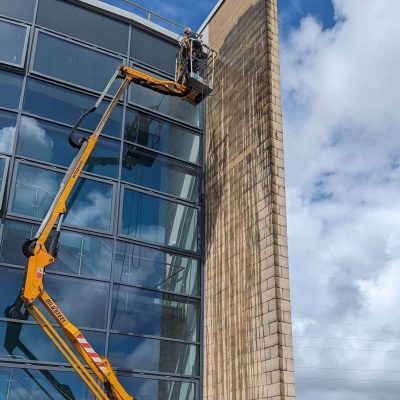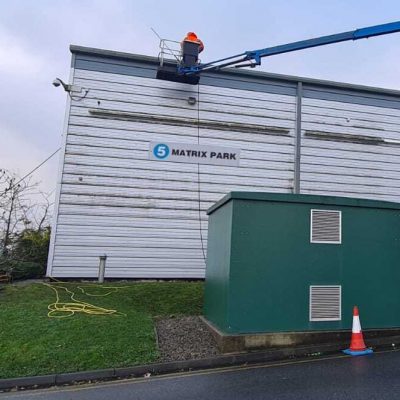Operating powered access equipment and mobile elevating work platforms (MEWPs) like cherry pickers, scissor lifts and boom lifts can be extremely dangerous if not operated properly. That’s why having the right training is absolutely crucial.
In the UK, the training standard for using this type of equipment is set by IPAF – so let’s take a closer look at exactly what IPAF is and the training they provide.
What is IPAF?
IPAF stands for the International Powered Access Federation. They are the world’s leading body for the powered access rental industry.
IPAF aims to promote the safe and effective use of platform access equipment worldwide. They set the standards for –
- training,
- provide technical guidance and
- influence legislation around powered access.
IPAF manages the Powered Access Licence (PAL) Card scheme in the UK. This shows operators are trained to use powered access equipment safely. The PAL Card has become the recognised standard for powered access training across the UK.
Why is IPAF training important?
IPAF MEWP training is very important for anyone planning to use powered access equipment like:
- Scissor lifts
- Boom lifts
- Cherry pickers
- Self-propelled booms
- Vertical personnel platforms
It ensures you have the necessary knowledge and skills to operate the equipment safely.
Without proper IPAF training and certification, you are risking serious injury or even death to yourself and others around you. The equipment can easily become unstable and collapse if mishandled.
By getting formal training and earning your IPAF licence such as IPAF 1b, IPAF 3a and 3b etc, you can show employers that you understand all the safety protocols and are qualified to use mobile elevated work platforms machines responsibly.
Many construction sites, facilities, venues and rental companies will require you to have IPAF certification or powered access licence before allowing you to operate any platform access equipment.
What are the different types of IPAF training courses?
IPAF offers training on all the major types of Mobile Elevating Work Platforms (MEWPs). The main IPAF training courses are:
- Static Vertical – For scissor lifts and vertical personnel platforms. Covers upright and rough terrain models.
- Mobile Vertical – For vertical booms like cherry pickers and van or truck-mounted lifts.
- Static Boom – For self-propelled booms that move on a static base but don’t travel while elevated.
- Mobile Boom – For travelling booms that can move while the boom is raised.
- Push Around Vertical – For low-level vertical lifts like push around scissor lifts.
The basic training courses take 1 day and include both theory training and practical exercises. Refresher courses are also recommended every 5 years.
For self-drive mobile booms, you need to take an additional module on driving the equipment. This takes the course to 2 days.
IPAF also offers training for:
- Mast climbing work platforms,
- Specialised machines,
- Insulated aerial device,
- Construction hoist, etc
What does IPAF training cover?
The IPAF courses cover everything you need to know to use powered access platforms safely. This includes:
Classroom theory training covers:
- Health and safety legislation
- Equipment technical knowledge
- Pre-use inspection
- Safe operating techniques
- Hazards and risks
- Emergency procedures
Practical exercises cover:
- Correct operating techniques
- Best practice
- Stability characteristics
- Effective manoeuvres
- Dealing with hazards
- Pre-use inspections
- Responding to problems
Assessment to confirm you have the:
- Required underpinning knowledge
- Skills for safe operation
- Ability to carry out pre-use inspections
The idea is to equip you with the full theory, knowledge and confidence to use the equipment properly in a real work environment.
What qualifications do you get after completing the IPAF MEWP operator training course?
Once you pass the IPAF training course, you will receive a few different qualifications:
- An IPAF Powered Access Licence (PAL) Card – This shows you are certified and able to operate that specific type of equipment e.g. 3a for Mobile Vertical. It will be valid for 5 years.
- An IPAF Safety Guide – Handy pocket booklet with safety guidelines.
- A Logbook – For recording your equipment operating experience.
- A Certificate – As formal proof of your training.
These qualifications are recognised across the powered access industry in the UK and beyond.
Many employers will look for the PAL Card as standard proof of training when hiring operators.
How to book IPAF training?
You have a few options for booking IPAF training in the UK:
- Many powered access rental companies offer IPAF courses, so it’s worth contacting your local suppliers.
- Manufacturers like Niftylift or Hinowa often provide training on their own equipment.
- Your employer may arrange in-house IPAF training if they have a big enough group requiring certification.
When booking, specify the exact IPAF course you need based on the equipment you’ll be using. Click here to find out the IPAF approved training centre in the UK.
What are the entry requirements?
IPAF training programme is open to anyone over 18 years old. There are no formal entry requirements (Though it depends on what type of course you want to attend).
However, you should be:
- Physically fit and healthy with no conditions affected by height or confined spaces
- Comfortable working at height
- Able to operate basic controls
What do IPAF assessments involve?
During the IPAF course, you will be assessed both theoretically and practically to confirm you have met the required standards.
Theory assessments are done via:
- Multiple choice exams – Testing your knowledge uptake from classroom teaching.
- Hazard observation tests – Spotting risks in photos and describing control measures.
Practical assessments require you to:
- Perform pre-use checks – Identify faults and deficiencies on the equipment.
- Manoeuvre exercises – Operate the MEWP through manoeuvres.
- Rescue exercises – Lower and rescue a casualty from height.
- Attachments – Correctly use accessories like work cages.
Assessments are continuous throughout the course to ensure you develop the necessary skills and confidence. The criteria are laid out clearly at the start of training so you know what to expect.
What’s involved in IPAF refresher training?
IPAF PAL Cards are valid for 5 years. When your card expires, you need to complete a refresher course.
You can now give your tests on Virtual Reality (VR). For more details click here.
Your course will recap on:
- Safety regulations
- Developments in technology/practice
- Pre-use inspection reminders
- Operating techniques
You must also perform:
- Theory assessments
- Observation tests
- Practical manoeuvring
This ensures your skills and knowledge are still up to standard before you renew your PAL Card.
What are the fundings you can get for IPAF training?
There are a few options to get funding support for IPAF courses:
- The Construction Skills Certification Scheme (CSCS) provides grant funding towards IPAF training for most construction workers.
- The Construction Industry Training Board (CITB) also offers grants for IPAF courses in some cases.
Why choose IPAF training?
| IPAF sets the standard | They are the leading global authority on the safe use of powered access equipment. |
| Industry recognised | The PAL Card is widely endorsed and specified for operating powered access platforms in the UK. |
| Covers all equipment | IPAF provides training on the full range of MEWPs you’re likely to encounter. |
| High quality | Combines detailed theory teaching with intensive hands-on practice. |
| Assessed | Tests both knowledge and practical skills to stringent standards. |
| Certified | Issues internationally recognised qualifications and photo ID cards. |
| Periodic refreshers | Ensure your skills remain current through refresher courses. |
So for anyone planning to work with powered access equipment like cherry pickers, scissor lifts or boom lifts, IPAF training has become the gold standard certification.



